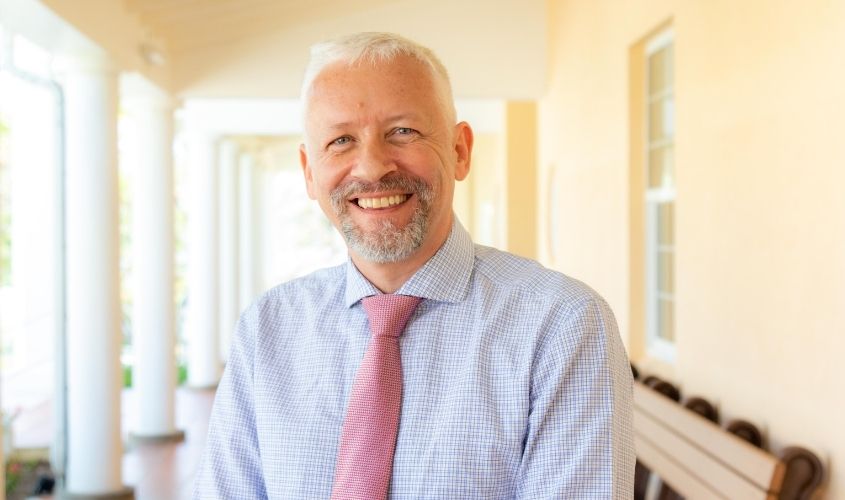
Why is learning the basic sciences so crucial to the study of medicine?
“In the basic sciences, we set the framework for all of the foundational requirements of clinical knowledge, skills, and behaviors” needed to apply to hospital medicine, according to Mark Clunes, PhD, the new senior associate dean of basic sciences at St. George’s University. He took on his new role when Dr. Marios Loukas was appointed dean of the School of Medicine earlier this year.
As dean of basic sciences, Dr. Clunes is tasked with ensuring that first- and second-year MD students are well-prepared to enter their clinical years. He knows the terrain well, having been a professor of physiology within the School of Medicine since 2008 and most recently serving as the associate dean of basic sciences. His wife, Dr. Lucy Clunes, also an SOM professor, was recently named the school’s dean of students.
Dr. Clunes shared his perspective on why mastering the basic sciences curriculum is crucial to clinical learning, the future of the virtual learning environment at SGU, and what he is most excited for when students return to campus.
St. George’s University: When students complete their basic science curriculum, how will they be prepared for the clinical years?
Dr. Clunes: Essentially, in the basic sciences, we set the framework for all of the foundational requirements of clinical skills; then in their clinical years they have to apply that knowledge to real patients with all the complexity of real patient presentation.
[av_testimonial_single src=’90361′ name=’Mark Clunes, PhD, senior associate dean of basic sciences at St. George’s University’ subtitle=” link=’http://’ linktext=” av_uid=’av-w4wg7v’]
“Campus is more than a location; it’s a place of study, a place where students relax, and a place where they interact and gather and share academic and extracurricular life. It’s a dynamic community and a space we share together. I am very much looking forward to regaining our community.”
[/av_testimonial_single]
[/av_testimonials]
SGU: How can students prepare for the transition from virtual back to in-person learning? What is the advantage to being back on campus?
Dr. Clunes: Although our curriculum has been delivered remotely during the COVID pandemic, we have continued to provide live interactive sessions, so the time management and study skills required to be successful in the remote program are very similar to those required for the on-campus environment.
However, the advantages of being back on campus are that this is a center of academic activity. The learning environment here on campus is tailored for study, either as individuals or in groups, whereas home is not always equivalent. So for the most part, the return to campus will provide an opportunity to re-establish study communities and provide a stable supportive learning environment for success.
SGU: Will there be aspects of virtual learning that remain a part of the curriculum, even when students are on campus? In what ways?
Dr. Clunes: Certain elements have undoubtedly been advantageous virtually.
For instance, virtual “office hours” have allowed faculty to substantially increase the volume of students we can meet with, and these sessions have been appreciated by faculty as well as the students.
In terms of the core curriculum, we still think that community and engagement are vital, so the core elements of the curriculum will be delivered on site, but flexibility around supplemental activity will undoubtedly be increased.
Some examples include:
- Patient interviews using remote technology—this won’t be retained as an exclusive modality for patient encounters but targeted sessions for remote technology use with patients will be incorporated
- The advisory services will very likely offer both live or online options for students.
- Many of the supplemental learning sessions that run in the evenings on campus can now also be offered online, so that students can choose to remain on campus or participate from their home or dorm.
SGU: From an academic standpoint, what are students’ biggest concerns when they enter their first term?
Dr. Clunes: There is often apprehension about medical school and the demands of studying medicine. It is of course an academically challenging course of study. However, there is a wealth of support from the faculty, the course directors, University administration, and all of the advisory and support services. Everyone at SGU is here for one outcome—student success.

SGU: Is the study of COVID-19 now a part of the curriculum?
Dr. Clunes: Infectious disease, immunology, and public health have always been an important part of the curriculum. Our experience over the last 12 months demonstrated why it was so important to learn.
Moving forward, the faculty of the Departments of Microbiology, Immunology and Pharmacology, and Public Health will undoubtedly use the COVID pandemic and the wealth of research garnered as valuable educational tools.
SGU: What are you most excited about when students return to campus?
Dr. Clunes: Seeing campus return to the busy, energized place that it was when the students were present. Campus is more than a location; it’s a place of study, a place where students relax, and a place where they interact and gather and share academic and extracurricular life. It’s a dynamic community and a space we share together. I am very much looking forward to regaining our community.
To learn more about the School of Medicine’s MD curriculum, visit the SGU website.
– Laurie Chartorynsky